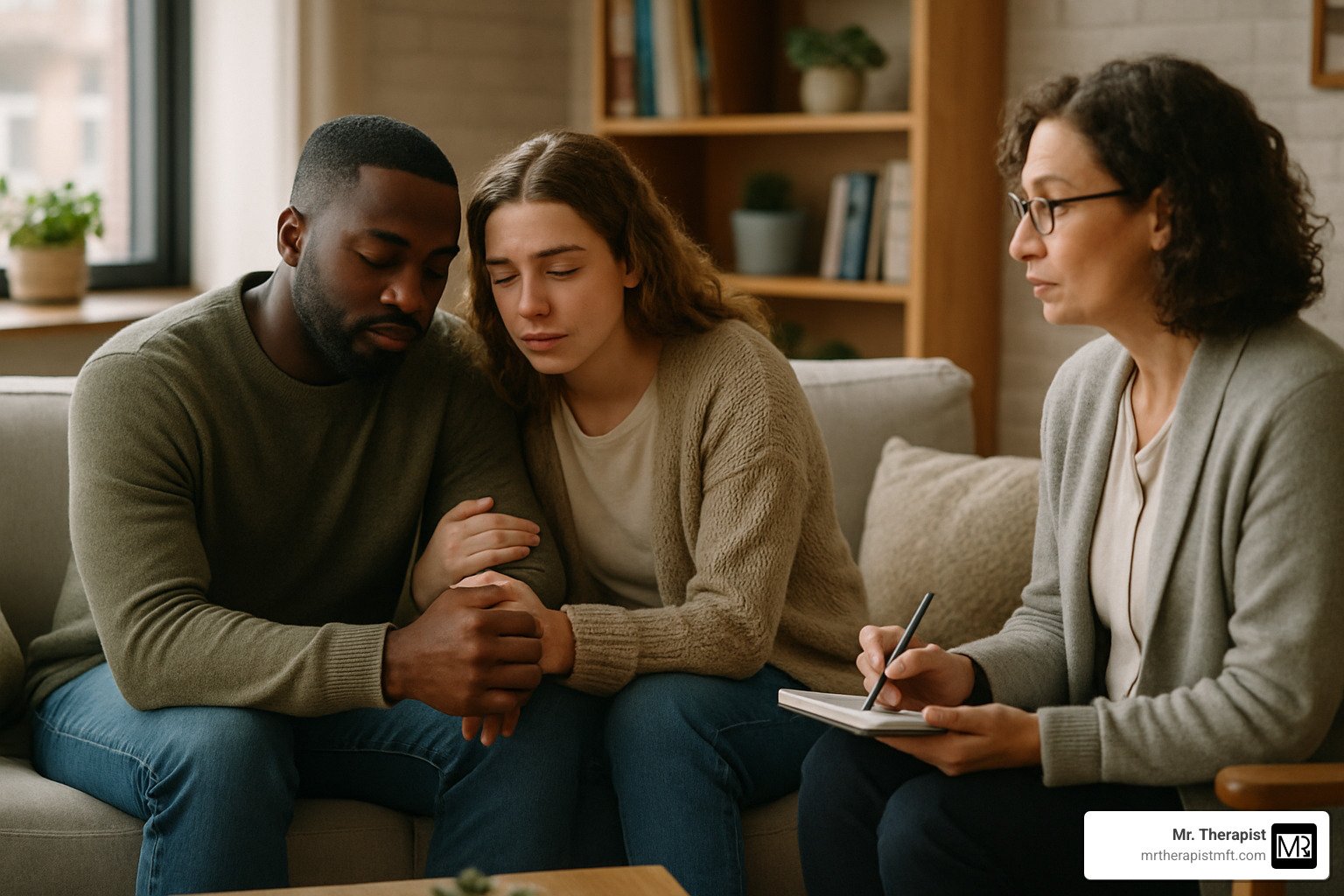
When considering couples therapy cost, it’s important to understand both its financial implications and the potential for significant relationship improvements. Here’s a quick overview:
- Average Cost: $155 to $250 per session, depending on income and location.
- Insurance: Often not covered; out-of-pocket expenses expected.
- Affordable Options: Sliding scale rates, online platforms, community clinics.
Couples therapy can be a compelling investment in both your relationship and emotional well-being. Whether you’re looking to rekindle intimacy, resolve recurring arguments, or simply communicate better, therapy offers a structured setting to work through issues together.
While it may seem like a hefty cost at first, remember the words from a satisfied customer, whose frequent arguments turned into productive conversations through guided help. As put by another happy client, “This app has helped us more in a couple of days than the real-life therapist.”
Investing in therapy is not just about understanding each other better; it’s about building a healthier, stronger bond. In the state of California, where busy lifestyles often lead to stress and miscommunication, finding the right couples therapy might be the step you need to improve your relationship drastically.

Understanding Couples Therapy Cost
When diving into the couples therapy cost, several factors come into play, each affecting the final price tag of your sessions. Let’s break them down:
Factors Influencing Cost
-
Geographic Location: In areas like San Clemente, CA, the cost can range significantly. Urban centers often have higher rates due to increased demand and living costs.
-
Therapist Expertise: The more experienced and specialized the therapist, the higher the fee. Therapists with advanced certifications in marriage and family therapy (like LMFT) often charge more.
-
Session Duration: Sessions typically last between 1 to 1.5 hours. Longer sessions might cost more, but they can also offer more time to dig into complex issues.
Cost with and without Insurance
Most insurance plans do not cover couples therapy because relationship issues aren’t classified as a mental illness. This means you might need to pay out-of-pocket. Here’s how it usually breaks down:
-
Without Insurance: Expect to pay between $60 and $250 per session. This can vary based on the factors mentioned above.
-
With Insurance: If your therapist accepts insurance, it’s crucial to verify if your policy covers any part of the sessions. Some plans might cover therapy if it’s billed under individual therapy for a diagnosed mental illness, but this is rare and can lead to complications if misrepresented.
-
Out-of-Pocket Expenses: These can be substantial, but many therapists offer sliding scale fees based on income, making therapy more accessible.
-
Copay Details: If insurance does apply, check your policy for copay amounts, which can add up over multiple sessions.

In summary, while couples therapy can be a financial commitment, the potential benefits for your relationship are significant. Consider the value of improved communication and emotional health when weighing the cost.
Affordable Couples Therapy Options
Navigating couples therapy cost can be daunting, but there are several affordable options available to help you and your partner improve your relationship without breaking the bank. Let’s explore some of these options:
Low-Cost Therapy Resources
-
Sliding Scale Therapy:
Many therapists offer sliding scale fees based on your combined income. For example, a 60-minute session might cost $155 if your income is less than $150,000. This flexible pricing ensures that therapy remains accessible to more couples, regardless of financial status. -
Community Health Clinics:
Federally funded clinics often provide affordable therapy services. These clinics can be a great resource for couples seeking counseling at a reduced cost. Check with your local health department to find a clinic near you. -
Online Therapy Platforms:
Platforms like Mr. Therapist offer cost-effective online sessions, starting at $69 per week. These services often include live sessions and unlimited messaging, providing flexibility and convenience. Online therapy eliminates travel time and allows you to connect with therapists outside your local area. -
Non-Profit Organizations:
Organizations such as the National Alliance on Mental Illness (NAMI) and Open Path Collective help connect individuals with affordable therapy. Open Path, for instance, charges a one-time $65 membership fee and offers sessions starting at $40. These organizations are dedicated to making mental health services accessible to everyone. -
University Counseling Centers:
Many universities offer counseling services to students and sometimes to the public at reduced rates. These centers are staffed with trained professionals and can be an excellent resource for affordable couples therapy. -
Employee Assistance Programs (EAPs):
Some workplaces offer EAPs, which provide free mental health support to employees and their families. These programs can include access to licensed counselors who can help address relationship issues.
By exploring these options, you can find a therapy solution that fits your budget while still offering the support you need to strengthen your relationship. Whether through sliding scale fees, community resources, or online platforms, affordable therapy is within reach for couples seeking to improve their connection.
Benefits of Couples Therapy
Couples therapy can be a game-changer for relationships, offering numerous benefits that can improve emotional health and communication skills. One of the standout methods in this field is Emotion-Focused Therapy (EFT).
Emotion-Focused Therapy
EFT is a powerful tool in couples therapy. It helps partners understand and manage their emotions, which is crucial for relationship improvement. By focusing on emotions, couples can identify and change negative patterns that cause conflicts.
Communication Skills: EFT encourages open, honest communication. By learning to express feelings and needs clearly, couples can resolve misunderstandings before they turn into major issues.
Emotional Health: Improved emotional health is another benefit of EFT. By addressing emotional wounds and building resilience, couples can create a stronger, more supportive relationship.
EFT Effectiveness: Research shows that EFT is highly effective. Many couples report feeling closer and more connected after just a few sessions. This method helps partners develop empathy and understanding, key components of a healthy relationship.
Emotional Resilience: EFT provides tools to build emotional resilience. Couples learn to support each other through difficult times, creating a solid foundation for facing future challenges together.
Overall, EFT equips couples with practical relationship tools. These tools are not just for resolving current issues; they also prepare couples to handle future conflicts constructively. By enhancing communication and emotional health, EFT can transform relationships, making them more fulfilling and lasting.
Frequently Asked Questions about Couples Therapy Cost
Why is couples therapy so expensive?
Couples therapy can seem pricey due to several factors. One major reason is insurance limitations. Not all insurance plans cover therapy, especially for couples, which means many people pay out-of-pocket. Even when insurance does cover therapy, there might be high copays.
Another factor is the specialized training that therapists undergo. Couples therapists often have advanced degrees and specific training in areas like Emotion-Focused Therapy (EFT). This expertise is valuable and contributes to the cost.
Is therapy worth it for couples?
Investing in therapy can be incredibly worthwhile for couples. Think of it as a relationship investment. Just like any investment, the returns can be significant. Therapy can improve communication, resolve conflicts, and strengthen emotional bonds.
Success rates in couples therapy are encouraging. Many couples find that therapy leads to a deeper understanding and connection. It can help prevent future issues and make relationships more resilient.
How many sessions are typically needed?
The number of sessions needed varies. Session frequency and relationship complexity are key factors. Some couples might see improvements after just a few sessions, while others may require more time.
A common frequency is every other week, which allows couples to practice new skills. However, if a relationship faces severe issues, weekly sessions might be necessary at first.
The duration depends on the couple’s specific needs and goals. The therapist will work with the couple to determine the best plan for their situation.
Conclusion
At Mr. Therapist, we believe that building emotional resilience and fostering healthy relationships are key to a fulfilling life. Our approach is centered around Emotion-Focused Therapy (EFT), which empowers individuals and couples to use their emotions as powerful tools for healing and growth.
Emotional Resilience is the backbone of any strong relationship. By understanding and managing emotions effectively, couples can steer challenges with confidence and grace. Our therapy sessions aim to equip partners with the skills they need to transform emotional struggles into opportunities for connection and understanding.
Healthy Relationships are not just about resolving conflicts; they are about creating a supportive environment where both partners can thrive. At Mr. Therapist, we focus on helping couples build a foundation of trust and open communication. This not only strengthens the bond between partners but also promotes individual well-being.
Choosing therapy is an important step toward nurturing your relationship. It’s an investment in your future together. Whether you’re facing communication issues, emotional disconnection, or other relationship challenges, we are here to guide you on your journey to a healthier, happier partnership.
Ready to take the next step? Explore our services and find how we can support you in building the relationship you deserve. Let’s work together to create a life filled with emotional resilience and lasting love.



